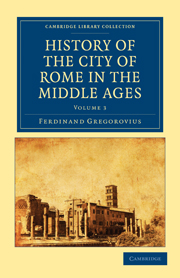CHAPTER VI
Published online by Cambridge University Press: 05 July 2011
Summary
Otto's criminal tribunal, even more appalling than the tribunal of his grandfather, filled the city with terror. The young emperor in one of his diplomas, however, records with satisfaction the day of Crescentius's execution; he fully believed that he had finally subdued Rome. The relations of the rebel also felt the consequences of his tragic fall. In the hope of extending their authority in the Sabina, they had clung to Crescentius as long as he was powerful, but at the time of his overthrow had prudently remained aloof. The sense of nationality never existed in the Campagna; there were no Romans outside Rome; no feeling of oneness ever united the inhabitants—severed by race and laws—of Roman territory. While the Roman Curial constitution had long perished in the provincial towns, a free citizen class had scarcely arisen before barons, bishops and abbots rose powerful above the mass of the coloni and bondsmen. All strove to obtain possession of the country towns or fortresses, and in many cases the popes invested influential families or bishoprics and convents with estates. Feudalism spread throughout the Roman territory; in some instances nobles took possession of entire districts, and from the middle of the tenth century, the baronial system of a secular as well as a spiritual nature became rooted in the soil, to survive as a curse of agriculture until our own days.
- Type
- Chapter
- Information
- History of the City of Rome in the Middle Ages , pp. 435 - 496Publisher: Cambridge University PressPrint publication year: 2010First published in: 1895



